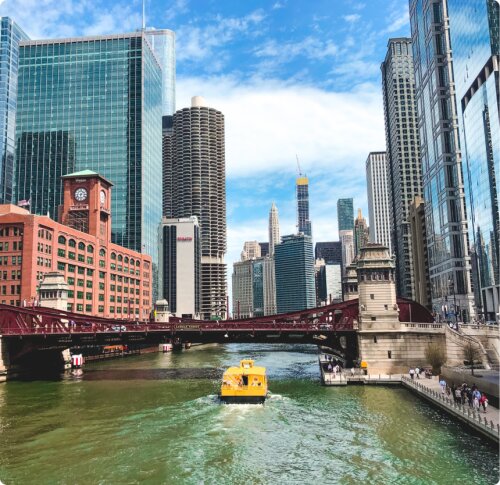Best Housing, Construction & Development Lawyers in Illinois
Share your needs with us, get contacted by law firms.
Free. Takes 2 min.
Free Guide to Hiring a Real Estate Lawyer
Or refine your search by selecting a city:
List of the best lawyers in Illinois, United States
About Housing, Construction & Development Law in Illinois, United States
Housing, construction, and development law in Illinois covers a wide range of rules and regulations governing the use, development, construction, and occupancy of residential and commercial properties. These laws ensure safe building practices, fair housing opportunities, zoning compliance, landlord-tenant relations, property transactions, and community development. The framework is shaped by Illinois state statutes, local municipal codes, and relevant federal laws such as the Fair Housing Act. Navigating these regulations is crucial for property owners, tenants, developers, builders, landlords, and real estate professionals to make informed decisions and avoid legal issues.
Why You May Need a Lawyer
Legal matters in housing, construction, and development can quickly become complex due to the array of agencies involved, the variety of contracts, and the stringent regulations that must be followed. Here are some common situations where you may require legal assistance:
- Handling disputes between landlords and tenants over leases, evictions, repairs, or return of security deposits
- Addressing construction defects or contractor disputes
- Navigating zoning or land use issues when developing or renovating property
- Enforcing or defending against code violations or permit disputes
- Ensuring fair housing compliance and addressing discrimination claims
- Drafting, reviewing, or negotiating purchase, sale, or lease agreements
- Managing boundary disputes or title concerns with neighbors or co-owners
- Pursuing claims for construction liens or unpaid work
- Dealing with accessibility requirements under state and federal law
In many cases, early legal intervention can help prevent expensive mistakes, expedite project timelines, or resolve disputes without litigation.
Local Laws Overview
Illinois has its own statutes and regulations for housing, construction, and development. Some key areas include:
- Landlord-Tenant Law: The Illinois Residential Tenants' Right to Repair Act, the Illinois Security Deposit Return Act, and local ordinances such as the Chicago Residential Landlord and Tenant Ordinance outline obligations for both parties, from rent payments to eviction procedures and habitability standards.
- Building Codes: Most municipalities in Illinois adopt versions of the International Building Code with local amendments, covering aspects like fire safety, structural integrity, plumbing, and electrical systems.
- Zoning and Land Use: Each city and county maintains zoning maps and ordinances dictating how land may be used, the type of structures allowed, building heights, set-backs, and parking requirements. Rezoning or special use permits may be needed for changes.
- Contractor Licensing: Illinois requires plumbers, roofers, and certain other trades to be licensed statewide, while other contractor licenses are governed locally.
- Fair Housing: State law mirrors federal antidiscrimination laws, adding protections against discrimination based on sexual orientation, gender identity, and in some jurisdictions, source of income.
- Mechanics Liens: Contractors, subcontractors, and suppliers may file a mechanics lien against property if they are not paid for work or materials, but strict deadlines and procedures apply.
- Subdivision & Development: Approval for new developments often requires navigating planning commissions, environmental reviews, and traffic studies, in addition to meeting all zoning and building requirements.
Frequently Asked Questions
What are my rights as a tenant if my landlord fails to make repairs?
Under Illinois law, tenants have the right to a safe and habitable dwelling. If a landlord fails to address necessary repairs after written notice, tenants may be able to withhold rent, make repairs and deduct costs, or seek legal remedies, depending on the local jurisdiction and the nature of the repair.
What are the basic requirements for a valid eviction in Illinois?
Landlords must follow defined procedures, including providing written notice (such as a five-, ten-, or thirty-day notice depending on the reason), filing an eviction action in court, and obtaining an order from a judge. Self-help evictions, like changing locks without a court order, are illegal.
Do I need a permit for home renovations?
Most cities and counties in Illinois require permits for significant repairs, additions, structural changes, plumbing, electrical work, and new construction. Contact your local building department to verify which projects require permits and ensure all work is compliant.
How can I resolve a dispute with a contractor?
Start by communicating with the contractor and documenting all correspondence. Review your contract terms. If unresolved, you may consider mediation or arbitration. Legal action or filing a complaint with the Illinois Attorney General’s office or local consumer protection agency may also be appropriate in disputes over payment or workmanship.
What is a mechanics lien and how can it affect my property?
A mechanics lien is a legal claim against your property by a contractor or supplier who has not been paid for work or materials. If not resolved, it can cloud your property's title and may lead to foreclosure proceedings. Quick action to dispute or satisfy liens is advised.
Are there protections against housing discrimination in Illinois?
Yes. Both federal and Illinois fair housing laws prohibit discrimination in housing based on race, color, religion, sex, disability, familial status, national origin, sexual orientation, and other protected classes. Local ordinances may expand these protections further.
How do I challenge a zoning decision or variance denial?
You typically have the right to appeal adverse zoning determinations or variance decisions with your local zoning board or in court. Legal counsel is advised, as these processes involve deadlines and technical arguments.
What happens if I fail to comply with building codes?
Non-compliance may result in citations, fines, mandated repairs, and, in severe cases, condemnation or demolition of the structure. Unsafe conditions putting residents or neighbors at risk can also lead to legal action or loss of insurance coverage.
Is it legal for a landlord to ask for more than one month's rent as a security deposit in Illinois?
Illinois does not have a statewide cap on security deposits. However, local ordinances (like Chicago) may place restrictions, and state law imposes requirements on when and how a security deposit is returned, including interest in some cases.
Where can I report unsafe or illegal construction activity?
You can report violations or unsafe conditions to your local building department, code enforcement office, or, in cases of worker safety, Illinois OSHA. Always document issues and provide as much detail as possible to expedite investigations.
Additional Resources
For more information or assistance, consider the following resources:
- Illinois Attorney General's Office - Consumer Protection Division
- Illinois Department of Financial and Professional Regulation (IDFPR) - Licensing and consumer complaints
- Illinois Department of Human Rights - Housing discrimination complaints
- Local city or county building and zoning departments
- Illinois Legal Aid Online - Free legal information and resources
- Fair Housing Centers and organizations
- Chicago Department of Housing or equivalent municipal agencies
- Better Business Bureau and local chambers of commerce for contractor background checks
Next Steps
If you believe you need legal assistance in the field of housing, construction, or development in Illinois, consider the following steps:
- Gather all relevant documents, including contracts, correspondence, permits, inspection reports, notices, and photos
- Contact your local building or zoning authority for guidance on regulations and necessary permits
- Reach out to a qualified attorney with experience in real estate, housing, or construction law for a consultation
- Consider free or low-cost legal aid organizations if you qualify based on income or specific legal issues
- Act promptly, as many legal rights and remedies are subject to strict deadlines
A knowledgeable lawyer can help you understand your rights, evaluate your options, and represent your interests to resolve issues efficiently and lawfully.
Lawzana helps you find the best lawyers and law firms in Illinois through a curated and pre-screened list of qualified legal professionals. Our platform offers rankings and detailed profiles of attorneys and law firms, allowing you to compare based on practice areas, including Housing, Construction & Development, experience, and client feedback.
Each profile includes a description of the firm's areas of practice, client reviews, team members and partners, year of establishment, spoken languages, office locations, contact information, social media presence, and any published articles or resources. Most firms on our platform speak English and are experienced in both local and international legal matters.
Get a quote from top-rated law firms in Illinois, United States — quickly, securely, and without unnecessary hassle.
Disclaimer:
The information provided on this page is for general informational purposes only and does not constitute legal advice. While we strive to ensure the accuracy and relevance of the content, legal information may change over time, and interpretations of the law can vary. You should always consult with a qualified legal professional for advice specific to your situation.
We disclaim all liability for actions taken or not taken based on the content of this page. If you believe any information is incorrect or outdated, please contact us, and we will review and update it where appropriate.
Browse housing, construction & development law firms by city in Illinois
Refine your search by selecting a city.

















